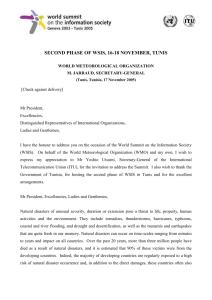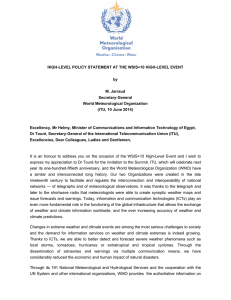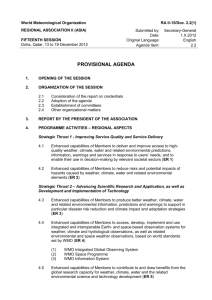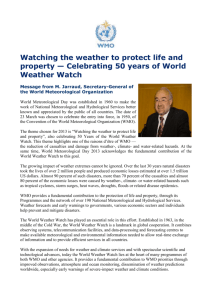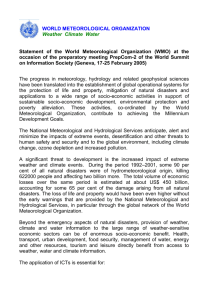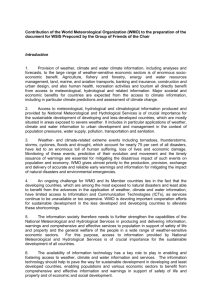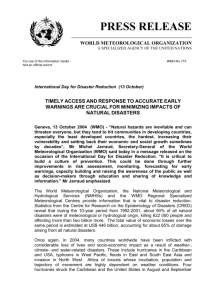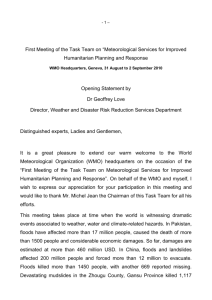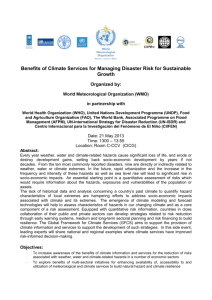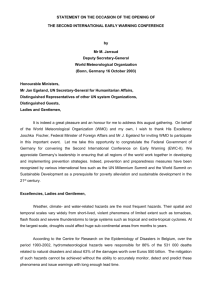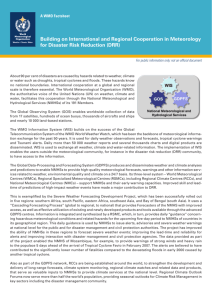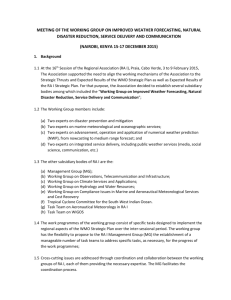English
advertisement
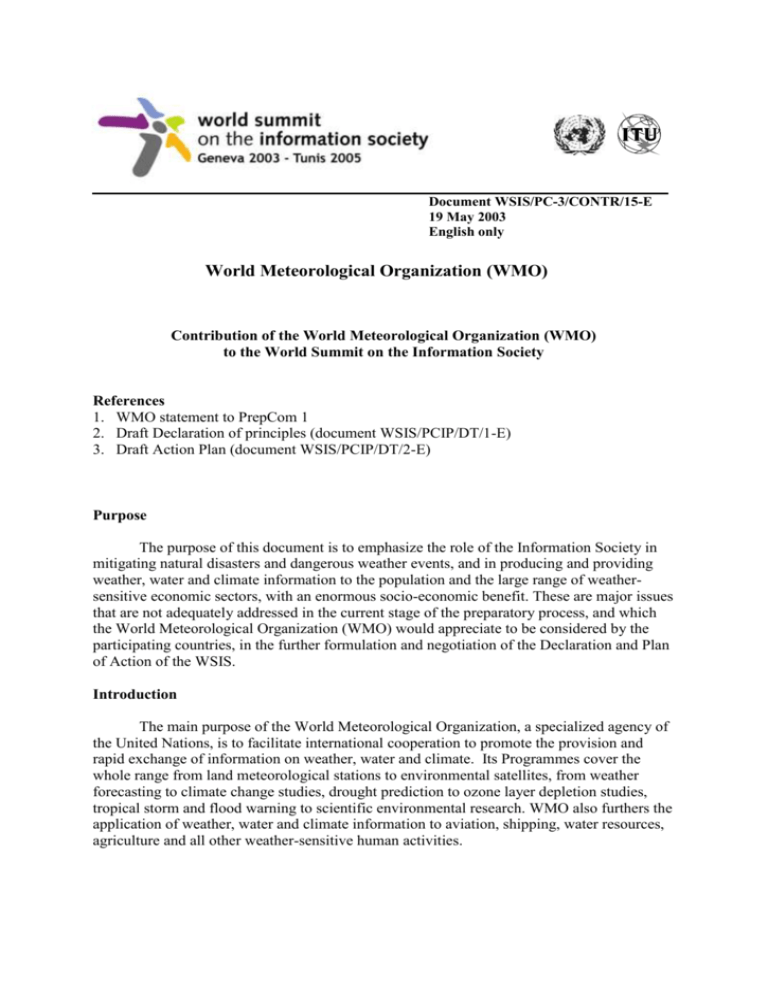
Document WSIS/PC-3/CONTR/15-E 19 May 2003 English only World Meteorological Organization (WMO) Contribution of the World Meteorological Organization (WMO) to the World Summit on the Information Society References 1. WMO statement to PrepCom 1 2. Draft Declaration of principles (document WSIS/PCIP/DT/1-E) 3. Draft Action Plan (document WSIS/PCIP/DT/2-E) Purpose The purpose of this document is to emphasize the role of the Information Society in mitigating natural disasters and dangerous weather events, and in producing and providing weather, water and climate information to the population and the large range of weathersensitive economic sectors, with an enormous socio-economic benefit. These are major issues that are not adequately addressed in the current stage of the preparatory process, and which the World Meteorological Organization (WMO) would appreciate to be considered by the participating countries, in the further formulation and negotiation of the Declaration and Plan of Action of the WSIS. Introduction The main purpose of the World Meteorological Organization, a specialized agency of the United Nations, is to facilitate international cooperation to promote the provision and rapid exchange of information on weather, water and climate. Its Programmes cover the whole range from land meteorological stations to environmental satellites, from weather forecasting to climate change studies, drought prediction to ozone layer depletion studies, tropical storm and flood warning to scientific environmental research. WMO also furthers the application of weather, water and climate information to aviation, shipping, water resources, agriculture and all other weather-sensitive human activities. WMO's proposals for the WSIS Principles and Plan of Action The elements that WMO would like to propose to be better reflected under the theme " ICT-Applications: Promotion of development-oriented ICT applications for all" of the Declaration of Principles and the Plan of Action to be adopted by the WSIS, are the following: The information society and E-Environment for mitigating natural disasters, dangerous weather related phenomena and environmental emergencies: provision and delivery of weather, water and climate information and warnings. 1 1.1 Most of all weather elements of unusual severity or for abnormal duration pose a threat to life, property, human activities and the environment, including tornadoes, thunderstorms, storms, cyclones, flood-producing rain or drought. Natural disasters, which occur on timescales ranging from minutes to years, have led to an enormous toll of human suffering, loss of lives and property damage. Severe weather has impacts on almost the entire world, but 90 per cent of the three millions people killed by natural disasters in the past twenty years lived in developing countries, which are mostly situated in areas prone to natural disasters and dangerous weather events. In addition to the direct damages, severe and extreme weather has serious indirect effects on food security and spreading of diseases, and sustained problems of desertification, famine and mass emigration. 1.2 Accidental or intentional (e.g. war-induced) release of hazardous materials into the atmosphere and water bodies also constitute a major threat to life and safety of mankind and can take on international or even global dimensions. Information and warnings on the predicted concentration of toxic or radioactive materials in the atmosphere and their predicted transportation and deposition is essential for mitigating the disastrous impact of such incidents on population and economy. 1.3 It is well recognized that the increasingly accurate and reliable information on weather, water and climate allows for improved decision-making, which has the potential to offset the negative impacts of weather and climate. Early warnings of weather, water and climate extremes protect life and property, provided that they can reach their target audience in a timely and suitable manner. 1.4 WMO gives the utmost priority to the production, provision and delivery of accurate and reliable warnings and information for mitigating natural disasters, dangerous weather events (cyclones, storms, flood-producing rain, droughts) and environmental emergencies. The information society, fostering ICT development and E-environment, would strengthen National Meteorological and Hydrological Services in producing and delivering information, warnings and comprehensive and effective services to their population in support of safety of life and property and the general welfare and convenience of the people. 1.5 Combined with more effective awareness programmes, and risk evaluation, disaster prevention and other preparedness measures, universal and equitable access to weather, water and climate warnings and information results in reducing loss of life and property caused by severe weather to a minimum. In this regard, the information society should support sustainable development for developing and less-developed countries, which are mostly situated in areas prone to natural disasters and dangerous weather related phenomena. p. 2 The information society and E-Environment for economic and social development: provision and delivery of weather, water and climate information and services. 2 2.1 Provision of weather, water and climate information, analyses and forecasts to the large range of weather-sensitive economic sectors is of enormous socio-economic benefit. Agriculture, fishery and forestry, energy and water resources management, land, marine, and aviation transports, banking and insurance, construction and urban design, and also human health, recreation activities and tourism all directly benefit from access to meteorological, hydrological and related information. Major societal and economic benefits for countries are expected from the access to climate information, including in particular climate predictions and assessment of climate change. 2.2 Access to meteorological, hydrological and climatological information produced and provided by National Meteorological and Hydrological Services is of crucial importance for the sustainable development of developing and less-developed countries, which are mostly situated in areas exposed to severe weather. It includes in particular applications of weather and climate information to urban development and management in the context of population pressures, water supply, pollution, transportation and sanitation. 3 Conclusions The Information Society has a key role in enabling and fostering access to weather, water and climate information and services that are produced and provided by National Meteorological and Hydrological Services in the framework of WMO Programmes. The information society should help to pave the way for sustainable development for developing and less-developed countries, enabling populations and various economic sectors to benefit from comprehensive and effective information and warnings in support of safety of life and property, of public general welfare and of economic and social development. Through several of its programmes, WMO is highly committed to the coordination and promotion of implementation of ICTs for improving the global, regional and national production, exchange and distribution of information and warnings on weather, water and climate, with a high priority towards sustainable development for the developing and less-developed world. In this regard, WMO places a great expectation in the Information Society and, in particular, in the opportunity of converting the digital divide into a digital opportunity. p. 3
